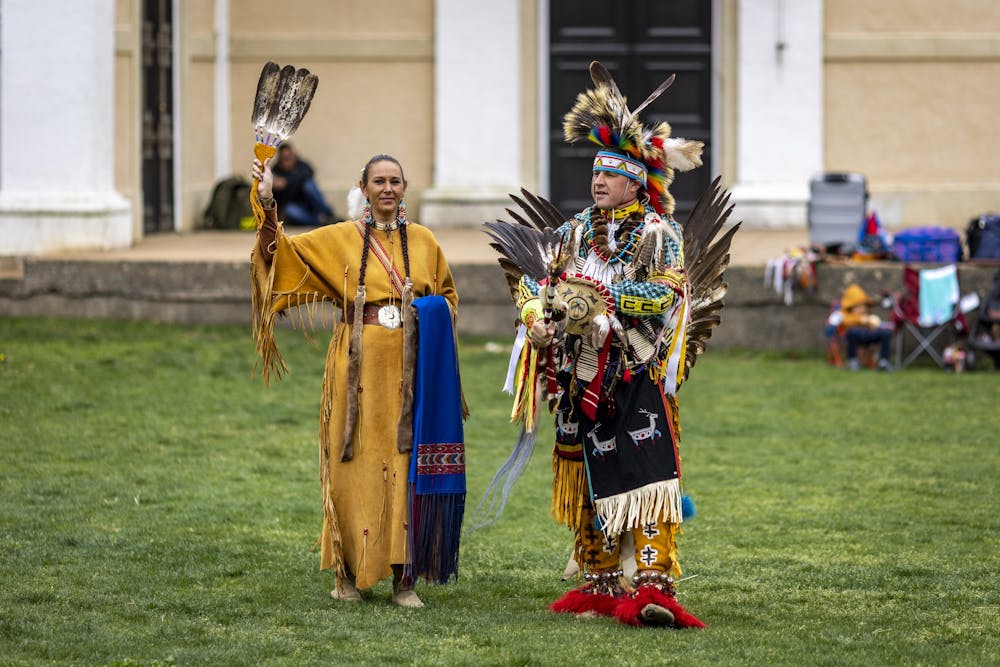Members from various Native American nations across Virginia, including the Monacan, Powhatan and Chickahominy tribes, gathered together to celebrate their Indigenous cultures at the University Saturday. A thundering drum performance from the Red Clay Singers signaled the beginning of the Powwow. Performers adorned in traditional regalia dispersed throughout the Amphitheater and danced along to the powerful rhythm. The Native American Student Association’s Powwow put Virginia’s Indigenous communities on center stage with a remarkable show of pride and solidarity.
Preparation for the event has been ongoing for nearly a year, beginning last May. Hailee Shelton, president of NASU and third-year College student, spearheaded the efforts to organize the Powwow to celebrate Indigenous culture and educate attendees about the rich legacy that still remains here today.
“There isn't really a space for indigenous culture here on Grounds and this Powwow is a front and center event for everyone… you need to bring that into the modern framework of we still exist,” Shelton said.
The organization also received funding from other organizations at the University — including Multicultural Student Services, the College of Arts and Sciences Dean and the Jefferson Trust — to help bring the event to life. Attendees trickled into the Amphitheater at 12 p.m. to witness the culmination of a year’s worth of preparation. The Powwow featured various performances including a men’s traditional dance, a women’s jingle, social dances and even a potato dance open to the public. Judges supervised the competitions to award the top three performers in the traditional men’s and women’s dance cash prizes.
The traditional men’s dance featured the men stomping their feet and moving their bodies to the beat from the large drum set in front of the stage, imitating warriors hunting or in battle. The dancers ducked and swerved at the sound of a powerful drum clap to mimic being shot at in battle and diving away. Keenan Stewart “Huntingwolf” from the Chickahominy tribe competed in the men’s traditional, earning second place. He said he felt honored to be able to participate in such a historic event and share his culture.
“I think it's very huge for our people to be able to dance here,” Stewart said. “I feel like there's a big barrier and it's like the word ignorance, but it's not really like a bad thing — it's just you don't know. [We’re] just trying to eliminate ignorance amongst everyone so we can communicate better, get along better.”
The Head Lady and Head Man functioned as the main organizers and judges for the competitions. Head Lady Jennifer Austin also judged some of the traditional dances. She came along with her kids and her husband, Head Man Quinton, to celebrate their Monocan heritage. She said she hopes that attendees take the opportunity to educate themselves about the different Indigenous populations in Virginia.
“A lot of people don't even realize that there are tribes in Virginia, which still kind of surprises me when there's actually a bunch of us,” Austin said. “Even just a little bit more knowledge and just a little bit more respect, for our people. And just a little bit more education just to realize that we're still here.”
Second-year College student Sophia Hernandez attended the event after hearing about it through social media and from friends. As a student with Indigenous roots from Peru, she said she thoroughly enjoyed learning more about the Indigenous cultures in Virginia.
“It's been beautiful,” Hernandez said. “I love seeing the dances and music just being able to share and get to experience the part of a culture that well, I don't really know much about. Because I myself have Indigenous roots, but I don't really know a lot about that side of me … so it's been very interesting.”
Kayah Branham, NASU member and first-year College student, participated in the Powwow as one of the only students in the women’s jingle. Seeing her Monocan culture in the spotlight at the University was a special moment for her.
“It means a lot coming into college,” Branham said “Seeing my culture being available for everyone to acknowledge and to learn, it means a lot to me.”
While the traditional dances only featured the performers themselves, the Powwow encouraged audience participation during the event with a few social dances. The emcee invited all attendees to hold hands and dance within a large circle in the center as the Red Clay Singers sang along to the rhythm to the drum they played. Hernandez said she was pleasantly surprised to be invited to participate.
“It was very nice when they asked us to do the social dance,” Hernandez said. “I didn't realize that we would get to do something like that, take part in something like that. It's a great opportunity.”
While organizing an event of this caliber, Shelton understood the importance of increasing the visibility of Indigenous culture in Charlottesville particularly, because both the city and the University were built on land occupied by the Monocan nation.
“I can't even express in words how important I think it is for the U.Va. community and the greater Charlottesville community, as a whole, to be exposed to Monocan culture … we really want the Powwow and other NASU events to be a place where Native and Indigenous students feel seen and salient within the community as the University works to mend these relations,” Shelton said.







